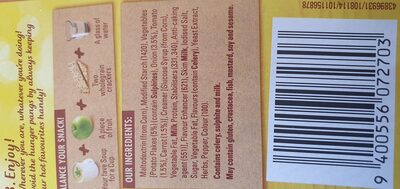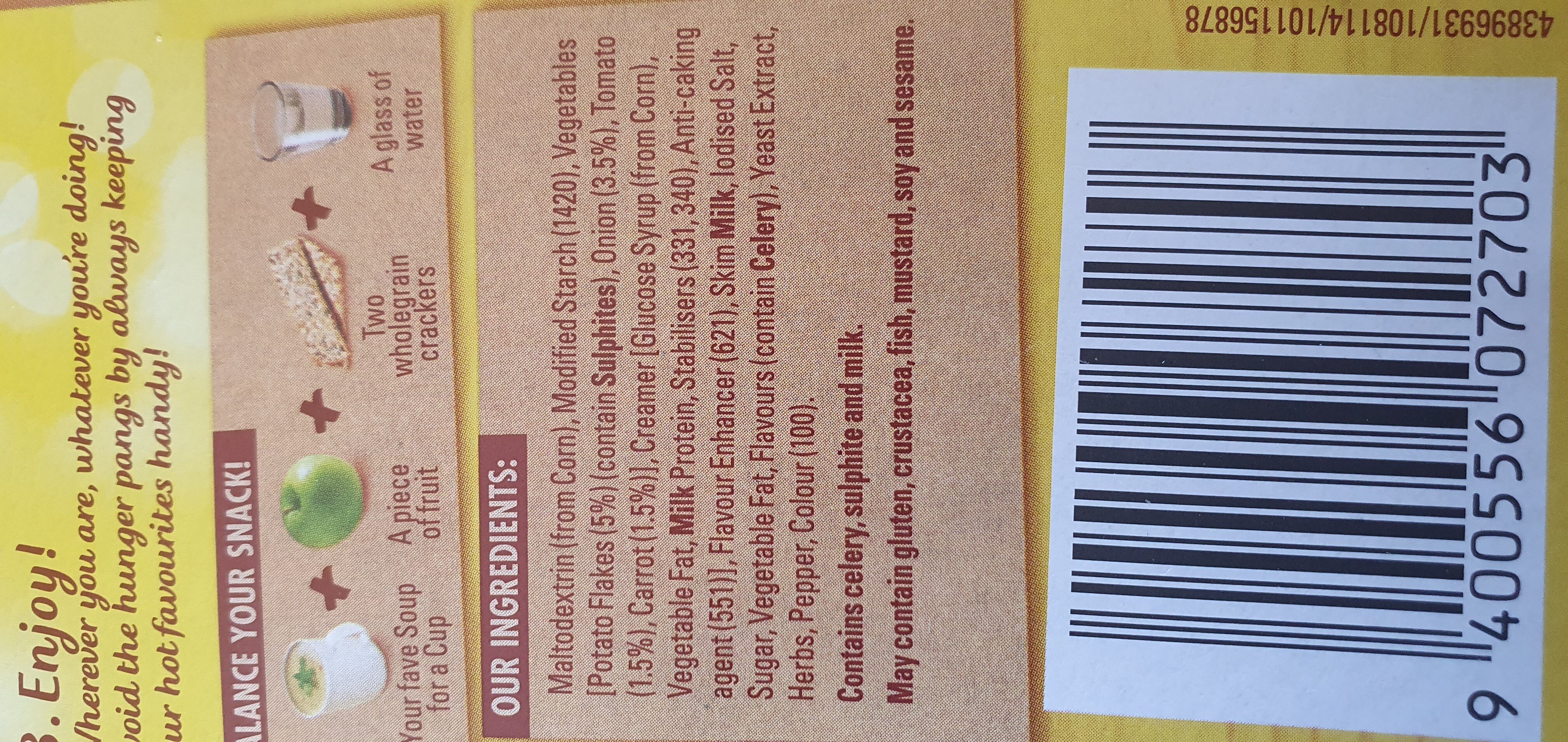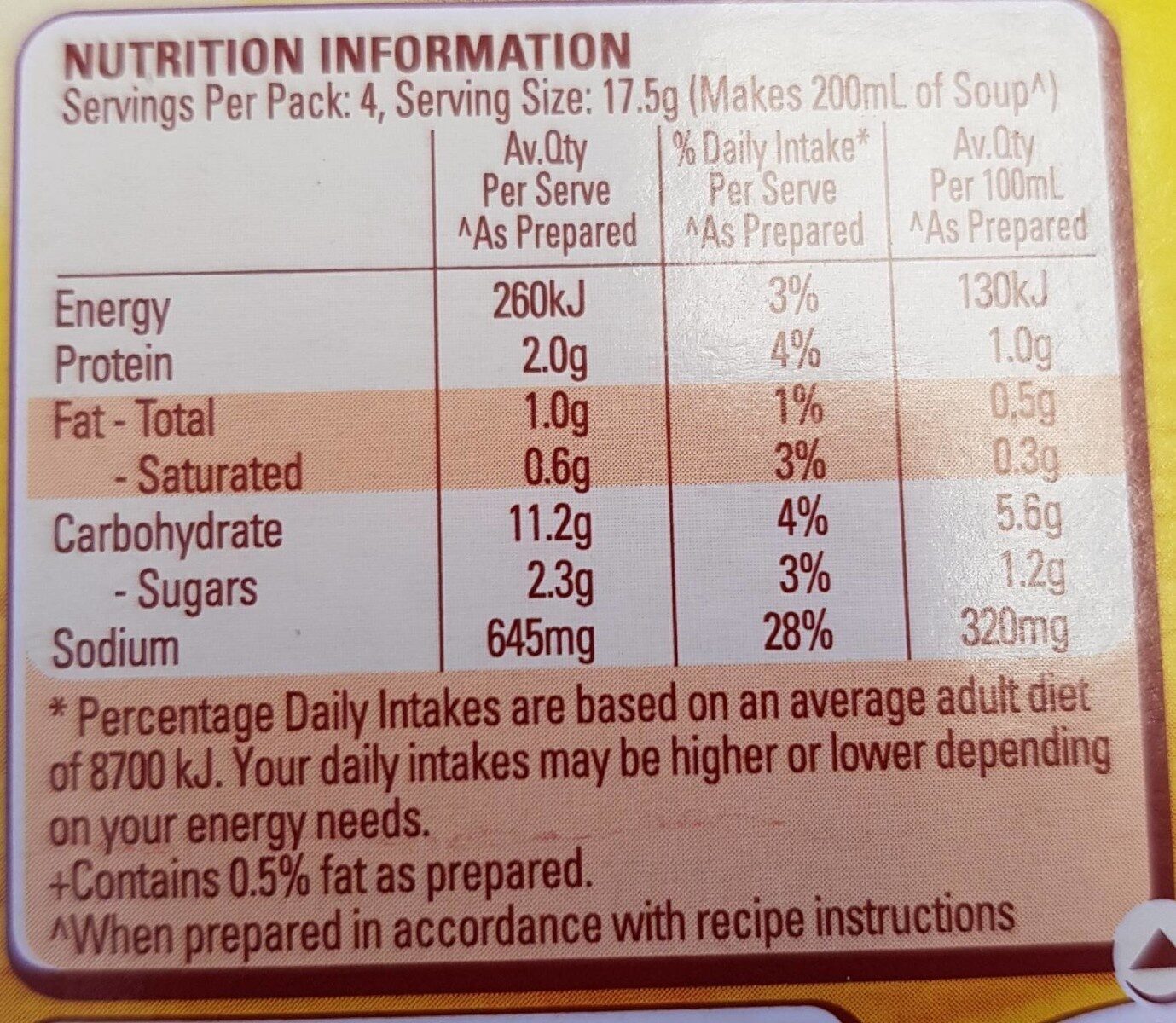Help us make food transparency the norm!
As a non-profit organization, we depend on your donations to continue informing consumers around the world about what they eat.
The food revolution starts with you!
Soupe légumes crémeux - Maggi - 200 ml
Soupe légumes crémeux - Maggi - 200 ml
This product page is not complete. You can help to complete it by editing it and adding more data from the photos we have, or by taking more photos using the app for Android or iPhone/iPad. Thank you!
×
Barcode: 9400556072703 (EAN / EAN-13)
Quantity: 200 ml
Brands: Maggi
Categories: Plant-based foods and beverages, Plant-based foods, Fruits and vegetables based foods, Meals, Soups, Vegetable soups
Labels, certifications, awards:
Health Star Rating, Health Star Rating 3
Countries where sold: New Zealand
Matching with your preferences
Health
Ingredients
-
38 ingredients
maltodextrin (from corn), modified starch (1420), vegetables [potato flakes (5%) (contain sulphites), onion (3,5%), tomato (1,5%), carrot(1,5%)], creamer [glucose syrup (from corn), vegetable fat, milk protein, stabilisers (331,340), anti-caking agent (551)], flavour enhancer (621), skim milk, lodised salt, sugar, vegetable fat, flavours (contain celery), yeast extract, herbs, pepper, colour (100), contains celery, sulphite and milk, may contain gluten, crustacea, fish, mustard, soy and sesame, 9 400556 072703Allergens: Celery, Milk, Sulphur dioxide and sulphitesTraces: Fish, Gluten, Mustard, Sesame seeds, Soybeans
Food processing
-
Ultra processed foods
Elements that indicate the product is in the 4 - Ultra processed food and drink products group:
- Additive: E100 - Curcumin
- Additive: E1420 - Acetylated starch
- Additive: E14XX - Modified Starch
- Additive: E551 - Silicon dioxide
- Additive: E621 - Monosodium glutamate
- Ingredient: Colour
- Ingredient: Flavour enhancer
- Ingredient: Flavouring
- Ingredient: Glucose
- Ingredient: Glucose syrup
- Ingredient: Maltodextrin
- Ingredient: Milk proteins
Food products are classified into 4 groups according to their degree of processing:
- Unprocessed or minimally processed foods
- Processed culinary ingredients
- Processed foods
- Ultra processed foods
The determination of the group is based on the category of the product and on the ingredients it contains.
Additives
-
E331 - Sodium citrates
Sodium citrate: Sodium citrate may refer to any of the sodium salts of citrate -though most commonly the third-: Monosodium citrate Disodium citrate Trisodium citrateThe three forms of the salt are collectively known by the E number E331. Sodium citrates are used as acidity regulators in food and drinks, and also as emulsifiers for oils. They enable cheeses to melt without becoming greasy.Source: Wikipedia
-
E340 - Potassium phosphates
Potassium phosphate: Potassium phosphate is a generic term for the salts of potassium and phosphate ions including: Monopotassium phosphate -KH2PO4- -Molar mass approx: 136 g/mol- Dipotassium phosphate -K2HPO4- -Molar mass approx: 174 g/mol- Tripotassium phosphate -K3PO4- -Molar mass approx: 212.27 g/mol-As food additives, potassium phosphates have the E number E340.Source: Wikipedia
-
E551 - Silicon dioxide
Silicon dioxide: Silicon dioxide, also known as silica, silicic acid or silicic acid anydride is an oxide of silicon with the chemical formula SiO2, most commonly found in nature as quartz and in various living organisms. In many parts of the world, silica is the major constituent of sand. Silica is one of the most complex and most abundant families of materials, existing as a compound of several minerals and as synthetic product. Notable examples include fused quartz, fumed silica, silica gel, and aerogels. It is used in structural materials, microelectronics -as an electrical insulator-, and as components in the food and pharmaceutical industries. Inhaling finely divided crystalline silica is toxic and can lead to severe inflammation of the lung tissue, silicosis, bronchitis, lung cancer, and systemic autoimmune diseases, such as lupus and rheumatoid arthritis. Uptake of amorphous silicon dioxide, in high doses, leads to non-permanent short-term inflammation, where all effects heal.Source: Wikipedia
-
E621 - Monosodium glutamate
Monosodium glutamate: Monosodium glutamate -MSG, also known as sodium glutamate- is the sodium salt of glutamic acid, one of the most abundant naturally occurring non-essential amino acids. Glutamic acid is found naturally in tomatoes, grapes, cheese, mushrooms and other foods.MSG is used in the food industry as a flavor enhancer with an umami taste that intensifies the meaty, savory flavor of food, as naturally occurring glutamate does in foods such as stews and meat soups. It was first prepared in 1908 by Japanese biochemist Kikunae Ikeda, who was trying to isolate and duplicate the savory taste of kombu, an edible seaweed used as a base for many Japanese soups. MSG as a flavor enhancer balances, blends, and rounds the perception of other tastes.The U.S. Food and Drug Administration has given MSG its generally recognized as safe -GRAS- designation. A popular belief is that large doses of MSG can cause headaches and other feelings of discomfort, known as "Chinese restaurant syndrome," but double-blind tests fail to find evidence of such a reaction. The European Union classifies it as a food additive permitted in certain foods and subject to quantitative limits. MSG has the HS code 29224220 and the E number E621.Source: Wikipedia
Ingredients analysis
-
May contain palm oil
Ingredients that may contain palm oil: Vegetable fat, Vegetable fat
-
Non-vegan
Non-vegan ingredients: Milk proteins, Skimmed milk, Crustacean, FishSome ingredients could not be recognized.
We need your help!
You can help us recognize more ingredients and better analyze the list of ingredients for this product and others:
- Edit this product page to correct spelling mistakes in the ingredients list, and/or to remove ingredients in other languages and sentences that are not related to the ingredients.
- Add new entries, synonyms or translations to our multilingual lists of ingredients, ingredient processing methods, and labels.
If you would like to help, join the #ingredients channel on our Slack discussion space and/or learn about ingredients analysis on our wiki. Thank you!
-
Non-vegetarian
Non-vegetarian ingredients: Crustacean, FishSome ingredients could not be recognized.
We need your help!
You can help us recognize more ingredients and better analyze the list of ingredients for this product and others:
- Edit this product page to correct spelling mistakes in the ingredients list, and/or to remove ingredients in other languages and sentences that are not related to the ingredients.
- Add new entries, synonyms or translations to our multilingual lists of ingredients, ingredient processing methods, and labels.
If you would like to help, join the #ingredients channel on our Slack discussion space and/or learn about ingredients analysis on our wiki. Thank you!
-
Details of the analysis of the ingredients
We need your help!
Some ingredients could not be recognized.
We need your help!
You can help us recognize more ingredients and better analyze the list of ingredients for this product and others:
- Edit this product page to correct spelling mistakes in the ingredients list, and/or to remove ingredients in other languages and sentences that are not related to the ingredients.
- Add new entries, synonyms or translations to our multilingual lists of ingredients, ingredient processing methods, and labels.
If you would like to help, join the #ingredients channel on our Slack discussion space and/or learn about ingredients analysis on our wiki. Thank you!
: maltodextrin (from corn), modified starch (1420), vegetables (potato flakes 5% (contain sulphites), onion 3.5%, tomato 1.5%, carrot 1.5%), creamer (glucose syrup (from corn), vegetable fat, milk protein, stabilisers (331‚340), anti-caking agent (551)), flavour enhancer (621), skim milk, lodised salt, sugar, vegetable fat, flavours (contain celery), yeast extract, herbs, pepper, colour (100), crustacea, fish, mustard, soy, sesame, 9 400556 072703- maltodextrin -> en:maltodextrin - vegan: yes - vegetarian: yes - percent_min: 11.5 - percent_max: 77
- from corn -> en:corn - vegan: yes - vegetarian: yes - ciqual_food_code: 9200 - percent_min: 11.5 - percent_max: 77
- modified starch -> en:modified-starch - vegan: yes - vegetarian: yes - ciqual_proxy_food_code: 9510 - percent_min: 11.5 - percent_max: 44.25
- 1420 -> en:1420 - percent_min: 11.5 - percent_max: 44.25
- vegetables -> en:vegetable - vegan: yes - vegetarian: yes - percent_min: 11.5 - percent_max: 11.5
- potato flakes -> en:potato-flakes - vegan: yes - vegetarian: yes - ciqual_food_code: 4003 - percent_min: 5 - percent: 5 - percent_max: 5
- contain sulphites -> en:sulfite - percent_min: 5 - percent_max: 5
- onion -> en:onion - vegan: yes - vegetarian: yes - ciqual_food_code: 20034 - percent_min: 3.5 - percent: 3.5 - percent_max: 3.5
- tomato -> en:tomato - vegan: yes - vegetarian: yes - ciqual_food_code: 20047 - percent_min: 1.5 - percent: 1.5 - percent_max: 1.5
- carrot -> en:carrot - vegan: yes - vegetarian: yes - ciqual_food_code: 20009 - percent_min: 1.5 - percent: 1.5 - percent_max: 1.5
- potato flakes -> en:potato-flakes - vegan: yes - vegetarian: yes - ciqual_food_code: 4003 - percent_min: 5 - percent: 5 - percent_max: 5
- creamer -> en:creaming-powder - percent_min: 0 - percent_max: 11.5
- glucose syrup -> en:glucose-syrup - vegan: yes - vegetarian: yes - ciqual_proxy_food_code: 31016 - percent_min: 0 - percent_max: 11.5
- from corn -> en:corn - vegan: yes - vegetarian: yes - ciqual_food_code: 9200 - percent_min: 0 - percent_max: 11.5
- vegetable fat -> en:vegetable-fat - vegan: yes - vegetarian: yes - from_palm_oil: maybe - percent_min: 0 - percent_max: 5.75
- milk protein -> en:milk-proteins - vegan: no - vegetarian: yes - percent_min: 0 - percent_max: 3.83333333333333
- stabilisers -> en:stabiliser - percent_min: 0 - percent_max: 2.875
- 331‚340 -> en:331-340 - percent_min: 0 - percent_max: 2.875
- anti-caking agent -> en:anti-caking-agent - percent_min: 0 - percent_max: 2.3
- 551 -> en:551 - percent_min: 0 - percent_max: 2.3
- glucose syrup -> en:glucose-syrup - vegan: yes - vegetarian: yes - ciqual_proxy_food_code: 31016 - percent_min: 0 - percent_max: 11.5
- flavour enhancer -> en:flavour-enhancer - percent_min: 0 - percent_max: 11.5
- 621 -> en:621 - percent_min: 0 - percent_max: 11.5
- skim milk -> en:skimmed-milk - vegan: no - vegetarian: yes - ciqual_proxy_food_code: 19051 - percent_min: 0 - percent_max: 11.5
- lodised salt -> en:lodised-salt - percent_min: 0 - percent_max: 11.5
- sugar -> en:sugar - vegan: yes - vegetarian: yes - ciqual_proxy_food_code: 31016 - percent_min: 0 - percent_max: 0.6
- vegetable fat -> en:vegetable-fat - vegan: yes - vegetarian: yes - from_palm_oil: maybe - percent_min: 0 - percent_max: 0.6
- flavours -> en:flavouring - vegan: maybe - vegetarian: maybe - percent_min: 0 - percent_max: 0.6
- contain celery -> en:celery - vegan: yes - vegetarian: yes - ciqual_proxy_food_code: 20055 - percent_min: 0 - percent_max: 0.6
- yeast extract -> en:yeast-extract - vegan: yes - vegetarian: yes - percent_min: 0 - percent_max: 0.6
- herbs -> en:herb - vegan: yes - vegetarian: yes - percent_min: 0 - percent_max: 0.6
- pepper -> en:pepper - vegan: yes - vegetarian: yes - percent_min: 0 - percent_max: 0.6
- colour -> en:colour - percent_min: 0 - percent_max: 0.6
- 100 -> en:100 - percent_min: 0 - percent_max: 0.6
- crustacea -> en:crustacean - vegan: no - vegetarian: no - percent_min: 0 - percent_max: 0.6
- fish -> en:fish - vegan: no - vegetarian: no - ciqual_proxy_food_code: 26140 - percent_min: 0 - percent_max: 0.6
- mustard -> en:mustard - ciqual_food_code: 11013 - percent_min: 0 - percent_max: 0.6
- soy -> en:soya - vegan: yes - vegetarian: yes - percent_min: 0 - percent_max: 0.6
- sesame -> en:sesame - vegan: yes - vegetarian: yes - ciqual_food_code: 15010 - percent_min: 0 - percent_max: 0.6
- 9 400556 072703 -> en:9-400556-072703 - percent_min: 0 - percent_max: 0.6
Nutrition
-
Good nutritional quality
⚠ ️Warning: the amount of fiber is not specified, their possible positive contribution to the grade could not be taken into account.⚠ ️Warning: the amount of fruits, vegetables and nuts is not specified on the label, it was estimated from the list of ingredients: 11This product is not considered a beverage for the calculation of the Nutri-Score.
Positive points: 0
- Proteins: 0 / 5 (value: 0.5, rounded value: 0.5)
- Fiber: 0 / 5 (value: 0, rounded value: 0)
- Fruits, vegetables, nuts, and colza/walnut/olive oils: 0 / 5 (value: 11.8, rounded value: 11.8)
Negative points: 0
- Energy: 0 / 10 (value: 65, rounded value: 65)
- Sugars: 0 / 10 (value: 0.6, rounded value: 0.6)
- Saturated fat: 0 / 10 (value: 0.15, rounded value: 0.2)
- Sodium: 0 / 10 (value: 64, rounded value: 64)
The points for proteins are counted because the negative points are less than 11.
Nutritional score: (0 - 0)
Nutri-Score:
-
Nutrient levels
-
Fat in low quantity (0.25%)
What you need to know- A high consumption of fat, especially saturated fats, can raise cholesterol, which increases the risk of heart diseases.
Recommendation: Limit the consumption of fat and saturated fat- Choose products with lower fat and saturated fat content.
-
Saturated fat in low quantity (0.15%)
What you need to know- A high consumption of fat, especially saturated fats, can raise cholesterol, which increases the risk of heart diseases.
Recommendation: Limit the consumption of fat and saturated fat- Choose products with lower fat and saturated fat content.
-
Sugars in low quantity (0.6%)
What you need to know- A high consumption of sugar can cause weight gain and tooth decay. It also augments the risk of type 2 diabetes and cardio-vascular diseases.
Recommendation: Limit the consumption of sugar and sugary drinks- Sugary drinks (such as sodas, fruit beverages, and fruit juices and nectars) should be limited as much as possible (no more than 1 glass a day).
- Choose products with lower sugar content and reduce the consumption of products with added sugars.
-
Salt in low quantity (0.16%)
What you need to know- A high consumption of salt (or sodium) can cause raised blood pressure, which can increase the risk of heart disease and stroke.
- Many people who have high blood pressure do not know it, as there are often no symptoms.
- Most people consume too much salt (on average 9 to 12 grams per day), around twice the recommended maximum level of intake.
Recommendation: Limit the consumption of salt and salted food- Reduce the quantity of salt used when cooking, and don't salt again at the table.
- Limit the consumption of salty snacks and choose products with lower salt content.
-
-
Nutrition facts
Nutrition facts As sold
for 100 g / 100 mlAs sold
per serving (200ml)Compared to: Vegetable soups Energy 65 kj
(15 kcal)130 kj
(31 kcal)-67% Fat 0.25 g 0.5 g -87% Saturated fat 0.15 g 0.3 g -73% Carbohydrates 2.8 g 5.6 g -46% Sugars 0.6 g 1.2 g -72% Fiber ? ? Proteins 0.5 g 1 g -57% Salt 0.16 g 0.32 g -77% Fruits‚ vegetables‚ nuts and rapeseed‚ walnut and olive oils (estimate from ingredients list analysis) 11.8 % 11.8 %
Environment
-
Eco-Score B - Low environmental impact
⚠ ️Select a country in order to include the full impact of transportation.The Eco-Score is an experimental score that summarizes the environmental impacts of food products.→ The Eco-Score was initially developped for France and it is being extended to other European countries. The Eco-Score formula is subject to change as it is regularly improved to make it more precise and better suited to each country.Life cycle analysis
-
Average impact of products of the same category: A (Score: 98/100)
Category: Soup, mixed vegetables, prepacked, to be reheated
Category: Soup, mixed vegetables, prepacked, to be reheated
- PEF environmental score: 0.08 (the lower the score, the lower the impact)
- including impact on climate change: 0.51 kg CO2 eq/kg of product
Stage Impact Agriculture
29.1 %Processing
35.8 %Packaging
12.1 %Transportation
12.6 %Distribution
5.5 %Consumption
4.9 %
Bonuses and maluses
-
Missing origins of ingredients information
Malus: -5
⚠ ️ The origins of the ingredients of this product are not indicated.
If they are indicated on the packaging, you can modify the product sheet and add them.
If you are the manufacturer of this product, you can send us the information with our free platform for producers.
-
Missing packaging information for this product
Malus: -15
⚠ ️ The information about the packaging of this product is not filled in.⚠ ️ For a more precise calculation of the Eco-Score, you can modify the product page and add them.
If you are the manufacturer of this product, you can send us the information with our free platform for producers.
Eco-Score for this product
-
Impact for this product: B (Score: 78/100)
Product: Soupe légumes crémeux - Maggi - 200 ml
Life cycle analysis score: 98
Sum of bonuses and maluses: -20
Final score: 78/100
-
Carbon footprint
-
Equal to driving 0.3 km in a petrol car
51 g CO² per 100g of product
The carbon emission figure comes from ADEME's Agribalyse database, for the category: Soup, mixed vegetables, prepacked, to be reheated (Source: ADEME Agribalyse Database)
Stage Impact Agriculture
20.3 %Processing
29.4 %Packaging
19.6 %Transportation
25.5 %Distribution
3.1 %Consumption
2.2 %
Packaging
-
Missing packaging information for this product
⚠ ️ The information about the packaging of this product is not filled in.Take a photo of the recycling information Take a photo of the recycling information
Transportation
-
Origins of ingredients
Missing origins of ingredients information
⚠ ️ The origins of the ingredients of this product are not indicated.
If they are indicated on the packaging, you can modify the product sheet and add them.
If you are the manufacturer of this product, you can send us the information with our free platform for producers.Add the origins of ingredients for this product Add the origins of ingredients for this product
Report a problem
-
Incomplete or incorrect information?
Category, labels, ingredients, allergens, nutritional information, photos etc.
If the information does not match the information on the packaging, please complete or correct it. Open Food Facts is a collaborative database, and every contribution is useful for all.
Data sources
Product added on by kiliweb
Last edit of product page on by charlesnepote.
Product page also edited by empresstya, inf, roboto-app, yuka.ZTU4cU9vUWxqT01McXN3aXdSWDhvc3BWNFp2eWNHS29HZWRBSUE9PQ.









